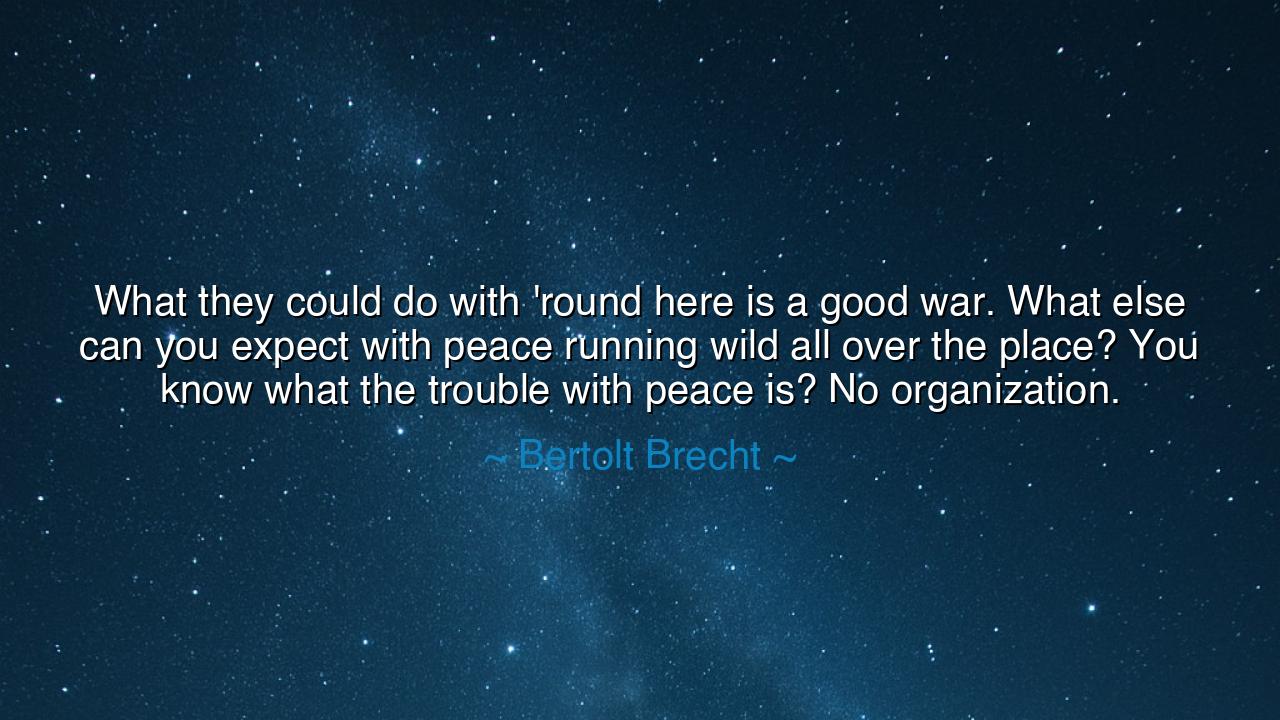
What they could do with 'round here is a good war. What else can
What they could do with 'round here is a good war. What else can you expect with peace running wild all over the place? You know what the trouble with peace is? No organization.






The words of Bertolt Brecht—“What they could do with 'round here is a good war. What else can you expect with peace running wild all over the place? You know what the trouble with peace is? No organization.”—burn with the sharpness of irony. They are not spoken as praise of war, but as satire, mocking a world that prepares endlessly for conflict yet neglects the harder labor of sustaining peace. Brecht, playwright of resistance and rebellion, sought to awaken his listeners to the absurdity of a humanity that organizes destruction with precision, but lets peace scatter like leaves in the wind.
For his words remind us of a bitter truth: war is carefully planned, supplied, and executed with ruthless order. Soldiers are trained, weapons forged, strategies drawn. Vast industries rise to sustain the machine of conflict. War, horrific as it is, carries the weight of organization. Peace, however, is often left untended—celebrated when it arrives, but seldom structured, cultivated, or defended with the same rigor. Thus Brecht’s irony cuts deep: peace is seen as wild, chaotic, and fragile, not because it must be so, but because men refuse to give it the same devotion they give to battle.
History confirms his words. After the First World War, the victors built a League of Nations to secure peace, but it was weak, underfunded, and ignored when most needed. No true organization held it together, and so the peace unraveled, leading swiftly to a second and even greater war. By contrast, after the Second World War, wiser minds gave peace more structure: the United Nations, international treaties, economic cooperation. Though imperfect, these efforts showed that peace, like war, demands design, resources, and vigilance.
Brecht’s satire also strikes at human nature. For too often men find unity in the face of a common enemy, but lose it when asked to live in harmony. During wars, entire nations march in lockstep; in times of peace, they fracture into factions, arguments, and apathy. Peace, left without discipline, dissolves into disorder, and disorder gives birth once more to war. Thus, Brecht’s biting humor is also a grim prophecy: if peace is left “running wild,” chaos will call forth violence to restore the order that men refused to build with reason.
Consider the rebuilding of Europe after 1945. It was not mere chance that peace endured; it was because leaders organized it with the Marshall Plan, with NATO, with economic unions that bound former enemies together. They remembered, perhaps unknowingly, the spirit of Brecht’s words: peace requires more than goodwill—it requires organization, vigilance, and structure. Without these, peace is but a pause between battles.
The lesson for us, then, is clear: do not treat peace as the natural state that will persist on its own. Peace must be built, guarded, and maintained as carefully as armies prepare for war. In our homes, this means tending relationships with care, resolving conflicts with patience, and creating habits of kindness. In our communities, it means building institutions of fairness and justice that prevent strife from festering. And in our world, it means investing in dialogue, diplomacy, and cooperation with the same seriousness as we invest in weapons.
Practically, this means giving peace the discipline of war: meetings as organized as councils of battle, plans as clear as strategies of conquest, and resources as vast as military budgets. For peace is not weakness, but the higher art of life, and it requires the same human genius we so wastefully pour into destruction. If war can be waged with precision, so too can peace be cultivated with vision.
So let Brecht’s irony linger in our hearts: “The trouble with peace is no organization.” Let us no longer allow peace to wander wild and unattended, waiting for war to give us order. Instead, let us be the organizers of peace, the generals of reconciliation, the architects of harmony. For in doing so, we prove that peace can be not a fleeting interlude, but a lasting order—an achievement as deliberate, as disciplined, and as enduring as any victory in war.






AAdministratorAdministrator
Welcome, honored guests. Please leave a comment, we will respond soon